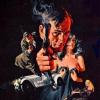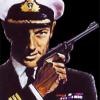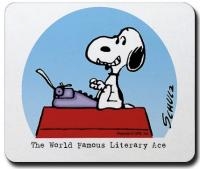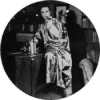Funny how page 100 seems to be the abort point for many. This is the point were Bond goes to Persia. For me, it just got better, because I find Iran in the 60s a fascinating location and a breath of fresh air as we've seen it in a Bond novel. But could it be the unfamiliarity about this region and the politics of a day a turn off for some?
For me, it was a turn-
on - I've actually always wanted Bond to go to somewhere like Iran, and I certainly enjoy a bit of politics.
However, I didn't feel that Faulks wrote about Iran in a way that brought it to life, which was a big disappointment to me after the vivid travelogue in his 1992 novel A FOOL'S ALPHABET.
DEVIL MAY CARE doesn't read as though Faulks went to Iran. "But it would have been too dangerous for him to go!" may be the obvious reply, but I do think Faulks
could have gone had he wanted to (although perhaps he has a strongly held moral objection to visiting that country because of the regime in power, which would be fair enough). I know of ordinary English folk who've been recently - granted, not many, and, sure, it took a fair bit of organising.... but it
can be done. Faulks would have been safe, and - as a famous novelist who did not intend to make Iranians the chief villains and who intended to show some respect for Iranian culture - he would probably have even been welcomed.
Here's Bond arriving in Iran in DMC:
As soon as he stepped from the plane, Bond felt the intense heat of the desert country. There was no air-conditioning inside the arrivals building, and he was already sweating by the time the customs official had chalked his bags. When going through US Customs, he used a British diplomatic passport, number 0094567, but always hated the thought of his name being flashed to and from CIA headquarters in Langley for clearance. Any wisp of evidence that he was present - even that he existed - diminished his security. In Tehran, the passport he showed to the earnest, moustachioed official in the glass booth identified him as David Somerset, company director. It was an alias Darko Kerim had given him in Istanbul, and he used it in memory of Darko, the loyal friend who'd died in helping him escape from SMERSH.
Outside the building, after he had swapped some currency, Bond stepped into a taxi and gave the driver the address of his uptown hotel. The entrance to Tehran was drab. There were factories pouring black smoke, featureless rectangular skyscrapers, cuboid houses, broad tarmacked roads with trees along the edge - little to distinguish it from any modern city if you discounted the odd piles of lemons on the roadside.
They went past Tehran University on Shah Reza Avenue, into Ferdowski Square where the famous poet, cast in bronze, pointed upwards to the sky as he declaimed his verses, then turned left and started to head north towards the more affluent end of town. From this point there were fewer livestock lorries, painted garishly in lime or sapphire, and not so many cars with family possessions strapped to the roof. It was as though at this latitude the city had taken a grip on itself in its desire to be more Western.
Bond offered the driver a cigarette, which, after two or three refusals that Bond could tell were half-hearted, was gratefully accepted. The man tried to engage him in conversation about football - 'Bobby Moore, Bobby Charlton' seemed to be the only English words he knew - but Bond was thinking of one name only: Julius Gorner.Now, then, what's wrong with the above? Well, not much, really, except that it's a bit flat and flavourless. It's proficient, workmanlike prose, lacking passion, atmosphere and a sense of authenticity - it's little more than no-frills reportage, meat-and-potatoes fare of the kind you'd expect of a novelization. For me, this is true of DMC more or less throughout.
The
real problem, though, is that Faulks has elsewhere - and quite without meaning to (!) - written about an exotic location in a much more vivid and
considerably more Flemingian voice. Consider the following:
James Bond was the only passenger to leave the plane when it stopped at Colombo on its way from Hong Kong to the Middle East. Hong Kong to Colombo is a strange trip to make. A few Chinese businessmen might reluctantly leave the Crown colony and inspect some business project in up-country Sri Lanka to see if it is worth the investment of a few million dollars. Or some unusually adventurous Sinhalese businessman might be returning after an attempt to raise capital in Hong Kong for a scheme in his native island. But these things are rare, and when Bond came down the steps of the Boeing 747, there was only him to feel the heavy night air that blew in from the palm trees round the airport.
It was a luxurious sensation. He was the only man to offer a passport to the smiling immigration clerk, the only man to see his suitcases carried in by the equally smiling porter. There was none of the usual feeling of displacement. There was hardly anyone there at all.
Bond wondered how the thin porter could carry his heavy cases outside to the taxi and tipped him an inordinate amount which in Hong Kong might have passed for normal but which in Colombo seemed to render the porter speechless. Soon the taxi driver was telling him how the Sri Lankan cricket team was as good as any in the world. He drove a Morris Oxford in high gear in the middle of the road, turning round frequently to emphasise his claims for the skill of Gehan Mendis or Ravi Ratnayake. He used the horn to move the night-time bicyclists and bullock carts, but never touched the brakes. His style of driving, one-geared, one-paced, was like that of a New York cab driver on Fifth Avenue when he gets a good run of lights late at night, though his conversation, not being a paranoid creole from behind bulletproof glass, was more enjoyable.
The night was exotically warm. The air was soft, though occasionally there would come a blast like that from an air extractor in the kitchen of an Indian restaurant. Bond lay back against the seat, unable to help out further on the problem of the island's shortage of quick bowlers. He watched the palm trees and wooden roadside shacks trail out behind them.The above is taken from A FOOL'S ALPHABET. Obviously, I've changed the character's name to "James Bond", but otherwise I've made no changes.
For my money, this A FOOL'S ALPHABET extract is
way more Flemingian than the DMC extract. It's vivid, it's man-of-the-world, and it's occasionally borderline.... well, non-PC, shall we say? Note in particular the last sentence of the third paragraph. It's all very Fleming indeed, in all sorts of ways, right down to a description of someone's driving style, and the "It was a luxurious sensation" observation.
Not only does Faulks disappoint when it comes to travelogue and the element of the bazaar, but he also falls short in terms of Fleming's famous Element of the Bizarre™ - "bazaar", "bizarre", geddit? Sorry.

Gorner's hand comes across as more comical than anything else, and merely begs the question of why someone so wealthy can't just get some expensive surgery or, y'know, at least shave the darn hair off! Faulks
does come up with a few bits of good, chilling dialogue, e.g. the following Gorner/Bond exchange:
'Who are these women?'
'They're no one. They're prostitutes. Most are addicts. They get scooped up along with the men. When they're losing their allure, say after two or three days, I let the men have their way with them.'
'You what?'
'The guards lead them down on to the factory floor and the men take them outside. It's free entertainment and it's good for morale.'
'And what do you do with the girls afterwards?'
Gorner looked at Bond curiously. 'Why, bury them, of course.'Sadly, though, DMC works only in fits and starts, handicapped by a tone that wobbles between the jokey (see the much-discussed Bond/May/Moneypenny/M extract) and the gritty, as well as by a by-the-numbers plot that seethes with missed opportunites.
Such as? Well, at one point Bond finds himself obliged to smoke opium, but nothing comes of this experience. Also, during the Russian scenes, it might have been nice to see 007 using his KGB training (between the events of YOU ONLY LIVE TWICE and THE MAN WITH THE GOLDEN GUN) against his former masters on their own turf - nothing major, but maybe just a little touch along the lines of "Thanks to Bond's brainwashing at the hands of the KGB, he knew that the Moscow police never carried spare ammunition". Something like that, perhaps. A fanboyish gripe? Maybe, but instead of mostly just namedropping Fleming characters, how about a little more creativity in tying DMC to the Fleming novels? At least to the degree of reflecting the key events of the books DMC is supposed to be a sequel to.
Characterisation in DMC is A Mixed Bag™. Gorner is actually a pretty interesting fellow, although by no means developed to his full potential. Scarlett is pure cardboard. As for Bond, well, moving on swiftly....
I liked the use of Leiter, although it seems that Faulks was unable to resist turning him into J.W. Pepper ("And just where the hell is Tehran?" exclaims Felix at one point), and it's lovely to see Mathis fleshed out a bit.... although what can one say about a Bond novel in which Mathis seems to have an even more active love life than our hero?!?!?!?!
The action scenes are uninspired and dull, and 007 never seems in much danger. The plot? Meh. There are some nice political/historical undercurrents, but they're never prominent enough to make the book particularly interesting.
DEVIL MAY CARE has its moments - a few. And it may improve on second reading (and without the weight of skyscrapingly high - albeit, on the face of it, fully justified - expectations). For now, though, my verdict is: a huge disappointment.







